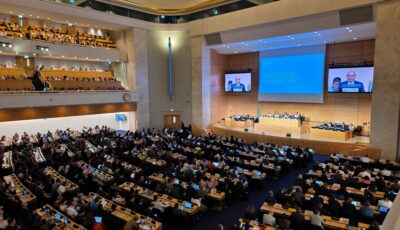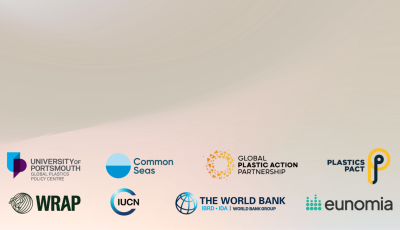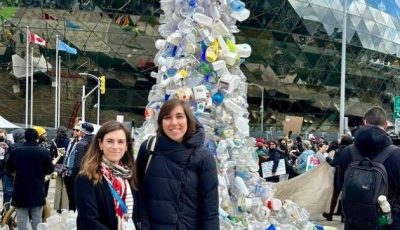By now, most people following the movement to end plastic pollution will know that negotiations towards a Global Plastics Treaty in Geneva earlier this month did not deliver an agreement.
However, what it did deliver was a unified and strengthened resolve among the willing. The week was full of energy, challenge, and determination, as governments, civil society, scientists, industry and frontline voices came together to push forward what could be the most significant international environmental agreement of our time.
Common Seas was on the ground in Geneva throughout the majority of the session, co-hosting events, building partnerships, and amplifying the voices calling for urgent, ambitious and just action. Here are a few insights on what we got up to during a busy and motivating week.
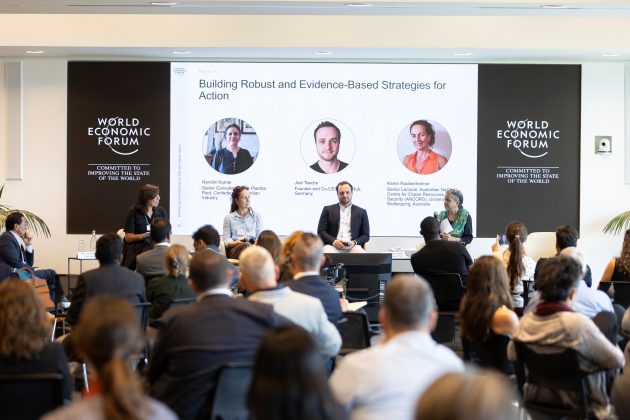
Launching our new National Planning Working Group on Plastics Action
On our first day in Geneva, we began on a high note with our co-hosted event, Building the Foundations for Effective National Plastic Action. The event formed the afternoon session of the World Economic Forum’s Beating Plastic Pollution: Solutions day, and took place at their offices overlooking the lakeside.
The session focused on the launch of our new collaborative National Planning Working Group on Plastics Action, which will work together to build member states’ confidence in national planning and drive more effective, ambitious action on plastic pollution in line with a Global Plastics Treaty.
Dr. Antaya March from the University of Portsmouth’s Global Plastics Policy Centre shared key learnings from our collective Insights Paper: Effective National Planning to Coordinate Action on Plastic Pollution.
Common Seas’ Director of Partnerships Thais Vojvodic chaired an engaging panel discussion, where speakers shared lessons from across national and frontline contexts. Key insights included:
- National planning should be seen as a process, not a one-off product.
The treaty can provide a framework, but we don’t need to wait – national action can and must start now. - Extracting what we know and sharing it widely is vital, to ensure countries don’t reinvent the wheel.
- There is strong political will to implement change, but capacity assistance is needed in under-resourced countries to turn ambition into action.
- Robust, transparent data with harmonised metrics is essential to underpin national planning.
- Frontline communities and waste pickers must not only be included, but integrated as decision-makers.
This event felt like a real step forward in building the foundations for strong, evidence-based national action to tackle plastic pollution. And while we may be waiting longer than hoped for the global rules to guide states, it was clear that there is already plenty of expertise and evidence to guide countries to take impactful action now.
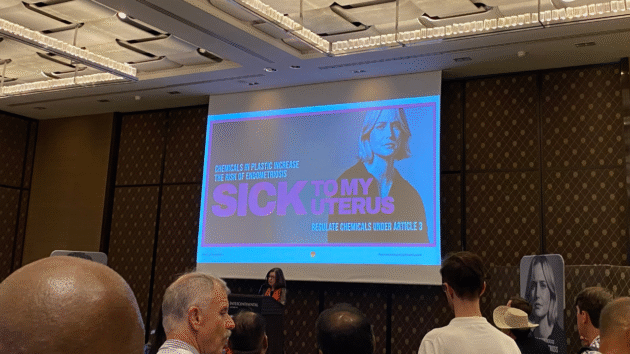
Spotlight on health
The links between plastics and human health were front and centre in Geneva.
Ahead of the start of negotiations, The Lancet held a side event launching their Countdown on Health and Plastics.
During panel discussions, we heard perspectives from experts in research, grassroots campaigning and government alike.
Jo Banner, Founder of The Descendants Project, spoke powerfully of life in Louisiana’s “sacrifice zones”, where fenceline communities living near petrochemical plants are already paying with their health. We don’t need to wait for more data to act, she urged: “We are living the evidence.”
John Chweya, President of Kenya National Waste Pickers Welfare Association, added to the grounding and sobering moment, reminding attendees that behind every statistic are lives lost to preventable illness. He spoke about how, as a former wastepicker, he doesn’t just see data when he reads reports – he sees the names of loved ones he has lost to the very illnesses that workers in the informal sector are so overexposed to.
Fiji’s Dr Sivendra Michael highlighted that Small Island Developing States are being “poisoned without consent” at large by legacy plastic pollution. He also stressed the need for greater regional collaboration on health research to plug data gaps on impacts among communities most affected by plastic pollution.
Then, after the stocktake plenary on Saturday 8th, the Minderoo Foundation held an evening event launching their new PlasticHealthAware dashboard – an interactive dashboard compiling health data for policymakers. Its aim is to create more clarity, using established peer review methodologies translated into an accessible, consistent format.
At the launch reception, guest speaker Juan Carlos Monterrey Gomez of the Panama delegation called for a ‘one health’ approach. He urged civil society and scientists to mobilise even more to “make it impossible for others to hide behind obstruction.”
Throughout our time on the ground, we also had several conversations with organisations to share updates on our health work and explore collaborative opportunities. It was encouraging to see that many share our perspective on the need to support bold policymaking by enhancing practice methodologies and getting the right data into the hands of leaders from across society who can advocate most powerfully for a healthy future.
"We don’t need to wait for more data to act. We are living the evidence.”
Jo Banner Founder of The Descendants Project
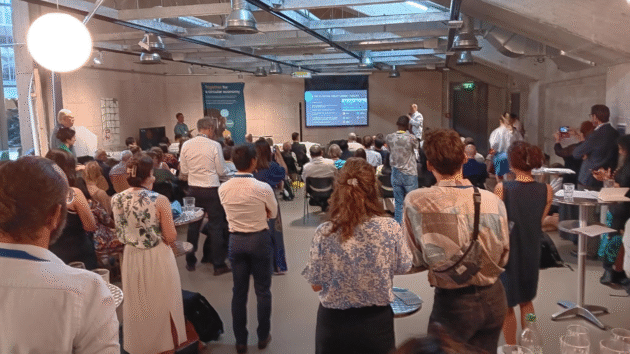
Capacity-building key to treaty implementation
During the week, several sessions took place exploring the role of capacity building in implementing an effective treaty.
On August 8th, Common Seas Executive Director Dr. Charlotte Davies hosted a panel focused on action planning and roadmaps at a side event hosted by the PREVENT Waste Alliance and IUCN: “CAPacity to Act: Reducing Plastic Pollution through Capacity Development”. This was a vibrant gathering of negotiators, practitioners, innovators, and community leaders united in their commitment to shaping a stronger Global Plastics Treaty.
A thought-provoking discussion underlined that:
- Solutions must be tailored to context.
- Data is vital, but it doesn’t need to be perfect to start taking action.
- Regional approaches can bridge gaps and avoid fragmentation.
- Long-term financing and infrastructure are non-negotiable for lasting impact.
Capacity building emerged as one of the clearest priorities for a treaty that can be effectively implemented on the ground. These discussions may be ahead of curve in terms of the treaty’s negotiation status, but it is clear that there’s no time to delay. Sharing knowledge and strengthening resources can – and must – start now.
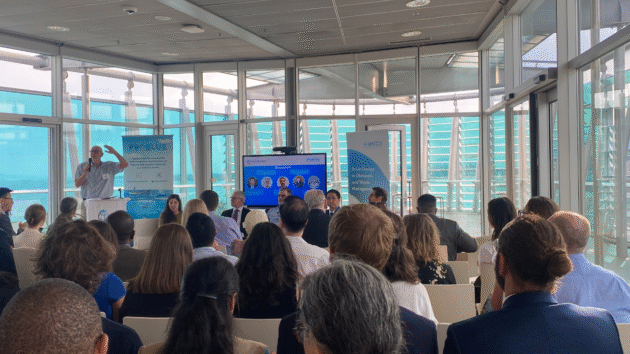
Exploring approaches to EPR
One specific aspect of capacity building and implementation that gained a lot of attention at INC5.2 was EPR – or Extended Producer Responsibility.
A ‘Meet the Experts on EPR’ event hosted by World Bank Group brought together leading organisations to delve into the technicalities, challenges and impacts with EPR. The session stressed how EPR has been impactful in driving greater transparency, environmental outcomes, higher material recovery rates and in some cases facilitating financial resources for waste management, but currently has not achieved the additional aim of providing incentives for circular design.
The panel also answered questions exploring the formalisation of recycling needs and just integration of wastepickers into EPR schemes. A key example came from Chile, where manufacturers, importers and governments are mandated to work with wastepickers directly when implementing EPR policies.
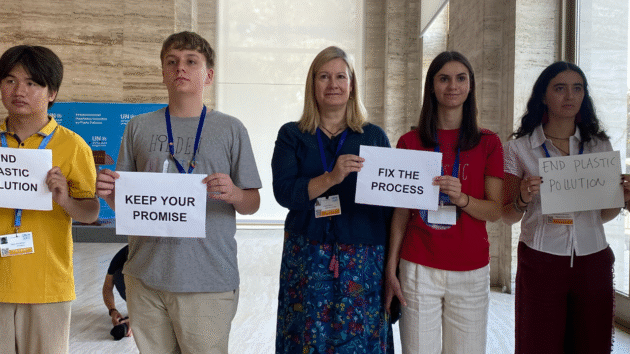
“A weak treaty will not protect any country from the impacts of inaction… you may not see the effects, but we will.”
Youth Plastic Action Network
Youth leading the charge
Young people were a real force for change at INC5.2.
A key moment for the youth movement was a side event launching the new Youth Plastic Action Network, led by the Children and Youth Major Group to UNEP but bringing together youth advocates from around the world.
Our friends at Hidden Plastic held a great Q&A session, and we also heard from youth activists like Dejea Lyons from the Cayman Islands. She highlighted that, for young people in SIDS that are overseas territories, the ability to directly influence negotiations is doubly challenging. However, what was clear is that youth leadership is rapidly growing within the treaty space and beyond – and young people continue to be powerful advocates for a just future, freed from plastic.
International Youth Day fell on August 12th, providing a perfect opportunity to amplify the voices of young people on the ground. We caught up with siblings Zara and Ashton Hawkins from Hidden Plastic to find out why the treaty is so important for young people, and what they want to see. Watch the video here.
The Youth Plastic Action Network will work with other youth institutions and constituencies Support – helping with admin, voting, amplifying voices. The session ended with a call to action for the need a mandate to fund youth action.
Looking ahead
For Common Seas, INC5.2 brought mixed feelings. Whilst the result was disappointing, our time in Geneva brought a week of connection, collaboration and renewed determination.
The road ahead is uncertain, but the voices from Geneva were clear: SIDS, frontline communities, youth, scientists and civil society are united in their call. Now, governments need to listen – and act.


